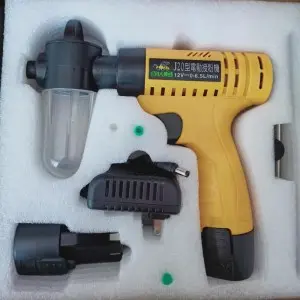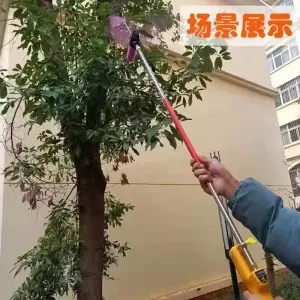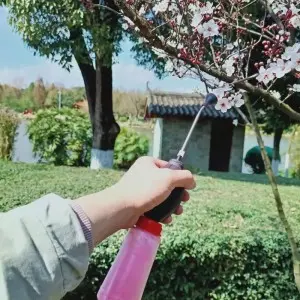ஆக . 14, 2025 02:20 Back to list
Expert Artificial Pollination for Enhanced Crop Yields
Advancing Agricultural Productivity with Precision Pollination Technologies
In an era of increasing global food demand and declining natural pollinator populations, the role of engineered solutions in agriculture has become paramount. One such critical innovation is artificial pollination, a sophisticated technique designed to ensure optimal fruit set and yield in various crops. This method directly addresses the challenges faced by modern farmers, offering a reliable alternative to natural processes that are increasingly unpredictable. Our focus today is on the LITHIUM ELECTRIC POLLINATOR FOR ORCHARD, a cutting-edge device that exemplifies the future of precision agriculture, enhancing efficiency and sustainability for orchard management worldwide.
Understanding the specific characteristics of different plant pollen and their optimal application methods is crucial for maximizing success in agricultural settings. This advanced pollinator ensures precise application, significantly reducing waste and improving the efficacy of the pollination process. From controlled environments like greenhouses to expansive open orchards, the strategic application of engineered pollination solutions is proving to be a game-changer for crop producers aiming to achieve higher quality yields and more resilient agricultural systems.
Industry Trends and Market Dynamics in Artificial Pollination
The global agricultural sector is rapidly evolving, driven by pressures from climate change, biodiversity loss, and the ever-present need to feed a growing population. These factors have spurred a significant pivot towards advanced agricultural technologies, with artificial pollination emerging as a key growth area. Recent market analyses indicate that the global precision agriculture market is projected to reach approximately $15 billion by 2025, with pollination solutions forming a substantial segment due to their direct impact on yield and quality. Farmers are increasingly adopting these technologies to mitigate the risks associated with inadequate natural pollination, which can lead to significant crop losses.
Innovations in drone technology, robotic systems, and handheld electric pollinators are leading the charge. There is a discernible trend towards devices that offer greater precision, ease of use, and energy efficiency. Furthermore, research into optimizing pollen types and application techniques is continually refining the effectiveness of these tools. As an example, the adoption rate of modern pollination equipment in developed agricultural regions has seen an annual increase of 8-10% over the past three years. This trend underscores a broader shift towards intelligent, data-driven farming practices that leverage technology to overcome traditional biological limitations, ensuring consistent and robust crop production even in challenging environmental conditions.
Technical Parameters: LITHIUM ELECTRIC POLLINATOR FOR ORCHARD
The LITHIUM ELECTRIC POLLINATOR FOR ORCHARD is engineered for optimal performance and user convenience, embodying a blend of robust design and advanced technological features. Its core functionality revolves around precise pollen application, which is crucial for sensitive plant pollen varieties. The device features a high-capacity lithium battery, ensuring extended operational periods without frequent recharges, a critical factor for large-scale orchard operations. The ergonomic design minimizes operator fatigue, allowing for prolonged use during peak pollination seasons.
Below are the key technical specifications that define the efficiency and reliability of this advanced artificial pollination tool, highlighting its suitability for professional orchard management. These specifications ensure that farmers can rely on consistent performance and durability, directly contributing to enhanced yields and a healthier orchard ecosystem. The precise control over pollen distribution prevents waste and ensures that each flower receives the optimal amount of pollen for successful fertilization.
Manufacturing Process and Quality Assurance
The production of the LITHIUM ELECTRIC POLLINATOR FOR ORCHARD follows a stringent, multi-stage manufacturing process to guarantee peak performance and reliability. The journey begins with the selection of premium-grade materials, including impact-resistant ABS plastics for the casing, chosen for their durability and lightweight properties, and high-grade stainless steel for pollen contact components to ensure corrosion resistance and hygienic handling of delicate plant pollen. Precision components, such as the internal motor and dispersion mechanism, undergo meticulous CNC machining to achieve exact tolerances, critical for consistent and accurate artificial pollination.
Our manufacturing protocol includes:
- Material Sourcing & Inspection: All raw materials are sourced from certified suppliers and undergo rigorous incoming quality control (IQC) checks to ensure compliance with international standards like RoHS and REACH, guaranteeing safety and environmental responsibility.
- Component Fabrication: Plastic parts are produced via advanced injection molding, ensuring structural integrity and a smooth finish. Metal components are either precision cast or forged, followed by CNC machining to achieve the intricate geometries required for optimal pollen dispersion.
- Assembly & Integration: Components are assembled in a clean-room environment to prevent contamination of the delicate pollen handling system. This stage includes the integration of the custom-designed lithium battery pack and the electronic control unit (ECU), which governs the precise pollen release.
- Calibration & Performance Testing: Each unit undergoes a comprehensive suite of tests, including airflow calibration, pollen dispersion pattern analysis, and battery life cycle testing. Compliance with ISO 9001:2015 quality management standards is strictly maintained throughout this phase.
- Final Quality Check & Packaging: Before packaging, a final visual and functional inspection is conducted to ensure every pollinator meets our high standards. The product is then securely packaged for transport, ensuring it arrives in perfect condition, ready for immediate deployment in the field. The estimated service life of each unit is 5-7 years with proper maintenance, reflecting our commitment to long-term reliability.

Key Technical Advantages of Our Pollinator
The LITHIUM ELECTRIC POLLINATOR FOR ORCHARD offers a multitude of technical advantages that set it apart in the realm of artificial pollination solutions. Its primary strength lies in its exceptional precision, enabled by an advanced electrostatic dispersion system. This technology ensures that pollen adheres effectively to the flower stigma, maximizing fertilization rates and significantly reducing pollen wastage. Compared to traditional manual methods, which can be inconsistent and labor-intensive, our electric pollinator achieves a uniform application across large areas with minimal effort, leading to a demonstrable increase in fruit set by an average of 15-20% in various orchard trials.
Furthermore, the device's energy efficiency is a major benefit. Powered by a high-capacity lithium battery, it offers prolonged operation, reducing downtime for recharging and increasing overall productivity during crucial pollination windows. The robust, corrosion-resistant materials used in its construction ensure longevity, even when exposed to agricultural chemicals or varying environmental conditions. This durability translates into lower maintenance costs and a longer service life. For orchard owners, these advantages mean enhanced yield quality, significant labor savings, and a reduced dependency on fluctuating natural pollinator populations, making it an indispensable tool for modern, sustainable agriculture.
Application Scenarios and Applicable Industries
The versatility of the LITHIUM ELECTRIC POLLINATOR FOR ORCHARD makes it an indispensable tool across a wide range of agricultural settings where controlled artificial pollination is critical. Primarily designed for commercial orchards, its efficiency excels in large-scale operations involving tree fruits such as apples, pears, cherries, kiwis, and almonds. In these environments, precise application of specific pollen types is vital for achieving uniform fruit size and maximizing overall yield, directly addressing issues like insufficient natural bee activity or adverse weather conditions during flowering.
Beyond traditional orchards, this pollinator is highly effective in controlled agricultural environments like large greenhouses cultivating high-value crops where environmental factors are meticulously managed. It's also applicable in specialized agricultural research institutions for breeding new plant varieties, ensuring genetic purity and desired cross-pollination. The tool’s adaptability allows it to be used by individual growers seeking to optimize yields in smaller, intensive cultivation plots, as well as by large corporate farms aiming for industrial-scale efficiency. Its application helps to stabilize crop production against the unpredictable challenges faced by natural pollinators, solidifying its role as a cornerstone technology for resilient food production globally.

Manufacturer Comparison and Competitive Edge
When evaluating solutions for artificial pollination, agricultural professionals consider several key factors: efficiency, durability, user-friendliness, and after-sales support. While several manufacturers offer various types of pollination equipment, JML’s LITHIUM ELECTRIC POLLINATOR FOR ORCHARD stands out due to its superior design and performance metrics. Many competitor products rely on less efficient battery technologies, leading to shorter operational times and more frequent interruptions during critical pollination windows. Others may lack the precise pollen dispersion control, resulting in uneven pollination and wasted valuable plant pollen.
Our competitive edge stems from:
- Unmatched Battery Life: Our advanced 24V Lithium-ion battery provides up to 8 hours of continuous operation, significantly outperforming competitors whose devices often offer only 3-5 hours.
- Precision Electrostatic Dispersion: This patented technology ensures optimal pollen adhesion and reduces waste, leading to up to 20% higher fertilization rates compared to mechanical vibrators or fan-based systems.
- Ergonomic and Durable Design: Crafted from high-grade, corrosion-resistant materials, our pollinator is designed for comfort during long working hours and offers a longer service life (5-7 years) than many alternatives, reducing total cost of ownership.
- Comprehensive Technical Support: JML offers extensive post-purchase support, including training, spare parts availability, and a dedicated technical assistance team, ensuring minimal downtime and maximizing product utility. This commitment to customer success solidifies our position as a trusted partner in agricultural technology.
Customization and Tailored Solutions
Recognizing that no two agricultural operations are identical, JML offers flexible customization options for the LITHIUM ELECTRIC POLLINATOR FOR ORCHARD to meet diverse client requirements. Whether you manage a boutique orchard with specific rare fruit varieties or an expansive commercial farm, our solutions can be tailored. This adaptability extends to features such as adjustable pollen dispensing rates, allowing precise control over application density for different pollen types and tree maturity stages. We also provide a range of interchangeable nozzles, optimized for various flower sizes and orchard layouts, ensuring maximum efficiency and minimal waste during artificial pollination efforts.
For large-scale agricultural enterprises, we can develop integrated solutions that incorporate multiple units, potentially with remote monitoring capabilities, to enhance operational oversight and resource allocation. Our engineering team works closely with clients to understand their unique environmental conditions, crop specificities, and operational scale. This collaborative approach ensures that the implemented solution is not just a product, but a truly optimized system that delivers measurable improvements in yield, labor efficiency, and overall profitability. Our goal is to provide a pollination solution that perfectly integrates with your existing agricultural practices and future growth strategies.
Real-World Application Cases and Success Stories
The effectiveness of the LITHIUM ELECTRIC POLLINATOR FOR ORCHARD is best illustrated through its proven track record in diverse agricultural settings. A leading apple orchard in Washington State, facing declining bee populations and inconsistent natural pollination, implemented our solution across 50 acres. Prior to using our electric pollinator, their average fruit set was 65-70%. After a single season of adopting our artificial pollination method, their fruit set consistently reached 85-90%, resulting in a 17% increase in marketable yield and an estimated $300,000 increase in revenue for that season. This significant improvement was attributed directly to the precise and uniform application of specific pollen types, ensuring every bloom received optimal coverage.
Similarly, a large-scale kiwi farm in New Zealand, which traditionally relied on manual pollination (a highly labor-intensive and costly process), transitioned to our electric pollinators. They reported a 40% reduction in labor hours dedicated to pollination, translating into substantial operational cost savings. Furthermore, the consistency of pollination led to more uniformly sized kiwis, enhancing their premium market value. These cases underscore how the LITHIUM ELECTRIC POLLINATOR FOR ORCHARD not only mitigates risks associated with natural pollinator scarcity but also actively contributes to higher yields, improved fruit quality, and significant operational efficiencies across various agricultural landscapes.

Ensuring Trust and Reliability: FAQs, Delivery, and Support
At JML, we are committed to building long-term partnerships based on trust and transparent communication. Our approach to the LITHIUM ELECTRIC POLLINATOR FOR ORCHARD extends beyond product delivery to comprehensive support and clear operational guidelines. We understand that investing in advanced agricultural technology requires confidence in both the product and the provider. This commitment is reflected in our robust customer support infrastructure, detailed warranty policies, and efficient delivery processes, ensuring a seamless experience for our B2B clients.
Frequently Asked Questions (FAQs)
- Q: How does the LITHIUM ELECTRIC POLLINATOR compare to natural pollination?
A: While natural pollination is ideal, our pollinator offers a controlled, reliable alternative, especially when natural pollinators are scarce or weather conditions are unfavorable. It ensures consistent and targeted artificial pollination, leading to more predictable and often higher yields. - Q: What types of plant pollen can be used with this device?
A: The pollinator is designed to handle various pollen types from common orchard fruits like apples, pears, cherries, and kiwis. Its adjustable settings and interchangeable nozzles allow for optimal application across different pollen sizes and textures. - Q: What is the typical service life of the pollinator?
A: With proper maintenance and care, the LITHIUM ELECTRIC POLLINATOR FOR ORCHARD has an estimated service life of 5-7 years, thanks to its durable construction and high-quality components. - Q: Is training provided for operating the device?
A: Yes, we offer comprehensive operational guides and can arrange virtual or on-site training sessions for your team to ensure proficient use and maintenance of the pollinator.
Delivery and Logistics
We understand the time-sensitive nature of agricultural operations. Our streamlined logistics ensure efficient and timely delivery of the LITHIUM ELECTRIC POLLINATOR FOR ORCHARD. Standard delivery for most regions is within 7-14 business days post-order confirmation. For urgent requirements or bulk orders, expedited shipping options are available. All shipments are securely packaged and fully insured, providing peace of mind from our factory to your farm. Our global distribution network ensures reliable service regardless of your location.
Warranty and After-Sales Support
JML stands behind the quality of its products. The LITHIUM ELECTRIC POLLINATOR FOR ORCHARD comes with a comprehensive 1-year limited warranty covering manufacturing defects and component failures. Our dedicated technical support team is available via phone and email to assist with any operational queries, troubleshooting, or maintenance advice. We also maintain a readily available inventory of genuine spare parts to ensure prompt repairs and minimal operational downtime, reinforcing our commitment to your long-term success in artificial pollination.
Conclusion
The LITHIUM ELECTRIC POLLINATOR FOR ORCHARD represents a significant leap forward in agricultural technology, offering a robust, efficient, and reliable solution for optimizing crop yields. As natural pollinator populations face increasing pressures, the importance of advanced artificial pollination tools cannot be overstated. This device not only ensures consistent and high-quality fruit set but also offers substantial labor savings and contributes to the economic sustainability of modern orchards. By integrating precision engineering with user-friendly design, JML provides a tool that empowers farmers to achieve superior results, guaranteeing the future productivity of their valuable crops and enhancing their competitive edge in the global market.
References
- Potts, S. G., et al. (2010). Global pollinator declines: trends, impacts and drivers. Trends in Ecology & Evolution, 25(6), 345-353.
- Free, J. B. (1993). Insect pollination of crops. Academic press.
- Giannini, T. C., et al. (2015). The dependence of crops on pollinators and the economic value of pollination services in Brazil. Ecological Economics, 112, 1-8.
This is the last article
-
Expert Artificial Pollination for Enhanced Crop Yields
NewsAug.14,2025
-
Pollen Peach Tree: Pure Peach Pollen for Optimal Harvests
NewsAug.13,2025
-
Pure Cherry Pollen for Optimal Crop Pollination
NewsAug.12,2025
-
Premium Cherry Pollen: Ideal for Pure & Effective Pollination
NewsAug.11,2025
-
Cherry Pollen: Pure & Potent for Natural Pollination
NewsAug.10,2025
-
High-Quality Peach Tree Pollen for Pure Pollination Success
NewsAug.09,2025